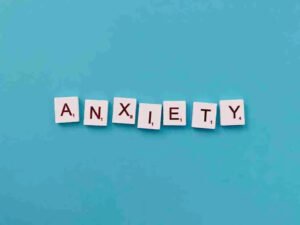The effects of anxiety are more than a fleeting feeling of worry or nervousness.
For men, especially African men, who may face societal pressures and expectations to remain strong and composed, anxiety often goes unspoken and untreated.
The effects of stress on men’s health can be surprisingly profound and far-reaching, impacting both mental and physical well-being in ways that may not be immediately visible.
In this article, we’ll discuss five significant, shocking effects that anxiety can have on men’s health, supported by scientific proof.
What is Anxiety and Why It Matters

Anxiety is a natural stress response, but when it becomes chronic, it can have serious consequences.
Anxiety disorders, ranging from generalized anxiety disorder (GAD) to panic disorders, can trigger a range of health issues, including heart disease, immune suppression, and cognitive problems.
Men, due to societal and cultural expectations, often face unique challenges in acknowledging and managing anxiety, leading to hidden but profound health consequences.
Addressing anxiety isn’t just about mental health; it’s a vital component of overall well-being, affecting physical, emotional, and social aspects of life.
Ignoring it can lead to lasting health challenges that may disrupt personal and professional life.
1. Increased Risk of Heart Disease

Anxiety can have a detrimental effect on cardiovascular health.
Studies show that men with chronic anxiety are at higher risk for heart disease due to prolonged stress responses that strain the heart.
-
Impact on Heart Rate
Anxiety increases heart rate and blood pressure, leading to a higher risk of hypertension.
This persistent state of high blood pressure damages arteries over time and may result in heart attack or stroke.
-
Increased Cortisol Levels
High levels of cortisol, the stress hormone caused by anxiety, can lead to plaque buildup in arteries, constricting blood flow and putting undue strain on the heart.
Proof: A study published in the Journal of the American Heart Association found that men experiencing long-term anxiety have a 30-50% higher chance of developing cardiovascular diseases compared to those who don’t suffer from anxiety.
2. Negative Impact on Sexual Health

One lesser-discussed but severe effect of anxiety on men’s health is its impact on sexual function.
Some effects of anxiety can lead to issues like erectile dysfunction (ED), reduced libido, and low testosterone levels, all of which harm a man’s intimate relationships and self-confidence.
-
Erectile Dysfunction
Anxiety leads to a “fight-or-flight” response, diverting blood flow away from non-essential functions like sexual organs, contributing to ED.
-
Reduced Libido
High anxiety levels lower testosterone, which directly affects libido and sexual desire.
-
Performance Anxiety
Worrying about sexual performance, exacerbated by general anxiety, can further reduce sexual satisfaction and lead to avoidance behaviors.
Proof: A report by the International Society for Sexual Medicine found that 20-30% of men with chronic anxiety report ED symptoms, with anxiety being a primary factor in sexual performance issues.
3. Weakened Immune System

Men dealing with chronic anxiety are more prone to illnesses and infections due to weakened immune function.
Anxiety triggers the release of stress hormones, such as cortisol, which suppresses immune responses, making the body less effective at fighting off pathogens.
-
Frequent Illnesses
Anxiety is linked to frequent colds, flu, and infections.
When under stress, the body prioritizes “survival” over immune function, leaving men more susceptible to bacteria and viruses.
-
Inflammation
Chronic anxiety increases inflammation in the body, a factor associated with autoimmune diseases such as rheumatoid arthritis and lupus.
Proof: Research published in Psychosomatic Medicine found that individuals with high levels of anxiety had significantly lower immune responses, making them more susceptible to infections and longer recovery times from illnesses.
4. Digestive System Problems

Anxiety has a strong connection with digestive health, and men often experience digestive symptoms due to chronic stress.
Known as the “gut-brain connection,” anxiety affects the digestive tract, causing issues ranging from stomachaches to irritable bowel syndrome (IBS).
-
Stomach Issues
Anxiety causes symptoms like nausea, bloating, and stomach cramps, often mistaken for food intolerances.
-
Irritable Bowel Syndrome
Many men with anxiety report experiencing IBS symptoms, such as constipation, diarrhea, and abdominal pain.
Anxiety affects the body’s ability to manage digestive function, making symptoms unpredictable and challenging to control.
-
Appetite Changes
Anxiety can lead to loss of appetite or overeating, both of which have implications for digestive health and overall well-being.
Proof: A study from Harvard Medical School shows that up to 60% of people with chronic anxiety report some form of gastrointestinal distress, proving the significant impact of stress on digestive health.
5. Cognitive Decline and Memory Issues

One of the most concerning effects of chronic anxiety on men’s health is its impact on cognitive function.
Anxiety interferes with focus, concentration, and memory, increasing the risk of cognitive decline as men age.
-
Difficulty Concentrating
Anxiety makes it challenging to focus on tasks, affecting performance at work and daily life. This, in turn, can lead to low self-esteem and social isolation.
-
Memory Loss
Prolonged anxiety may lead to memory issues, with men often finding it difficult to recall recent events or details.
-
Risk of Dementia
Chronic anxiety is associated with an increased risk of dementia and other cognitive disorders. Anxiety-related stress damages brain cells, leading to cognitive decline over time.
Proof: A Journal of Affective Disorders study indicates that men with high anxiety levels are at greater risk for early-onset dementia and cognitive decline, particularly when anxiety remains untreated over long periods.
How to Combat Anxiety for Improved Men’s Health
Addressing anxiety is essential to improving men’s health and reducing the risk of these severe health conditions.
Here are some practical ways to manage anxiety:
1. Regular Exercise

Physical activity is a powerful tool against anxiety.
Exercise releases endorphins, the body’s natural mood boosters, and helps reduce cortisol levels, alleviating stress.
2. Mindfulness and Relaxation Techniques

Practices like meditation, deep breathing, and yoga can help calm the mind, providing men with techniques to manage stress effectively.
These activities reduce heart rate, improve focus, and promote a sense of calm.
3. Healthy Diet

A diet rich in fruits, vegetables, and lean proteins supports physical health and provides essential nutrients for mental well-being.
Foods high in antioxidants and omega-3s are particularly beneficial for managing anxiety.
4. Social Connections
Talking to friends, family, or a therapist provides emotional support and can alleviate the burden of anxiety.
Men, especially, should prioritize open communication about mental health.
5. Professional Help

Seeking help from a mental health professional, such as a therapist or counselor, is crucial for managing chronic anxiety.
Cognitive-behavioral therapy (CBT), in particular, has proven effective for anxiety management.
Conclusion

Anxiety, when left unchecked, poses significant risks to men’s health, impacting everything from heart function to cognitive abilities.
The five effects discussed here illustrate the importance of acknowledging and addressing anxiety before it leads to more severe health conditions.
For African men, embracing mental health care is crucial to living a healthier, more fulfilling life.
Managing anxiety is not a sign of weakness but rather a pathway to stronger mental resilience and improved health.
Through regular exercise, mindfulness practices, and professional support, men can mitigate the harmful effects of anxiety and reclaim control over their health and well-being.
————————————————————-
For more information on mental health, fitness, and products that support overall wellness, visit Enthusiast Express.
Enthusiast Express is a trusted resource for men’s health, offering guidance, products, and expert advice tailored to your needs.
Whether you’re seeking mental health support, fitness gear, or dietary supplements, Enthusiast Express is here to help you achieve your health goals and boost your well-being.

